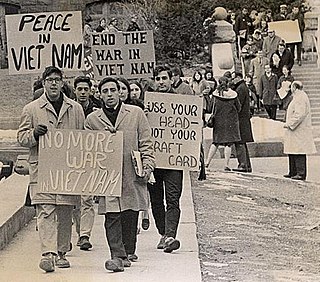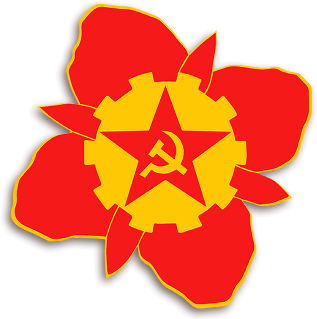The War Resisters League (WRL) is the oldest secular pacifist organization in the United States. The organization is celebrating its centennial from the founding date of October 19 into 2024.

The Communist Party of Canada is a federal political party in Canada, founded in 1921 under conditions of illegality. Although it does not currently have any parliamentary representation, the party's candidates have previously been elected to the House of Commons, the Ontario legislature, the Manitoba legislature, and various municipal governments across the country. The party has also made significant contributions to Canada's trade union, labour, and peace movements.

Draft evasion is any successful attempt to elude a government-imposed obligation to serve in the military forces of one's nation. Sometimes draft evasion involves refusing to comply with the military draft laws of one's nation. Illegal draft evasion is said to have characterized every military conflict of the 20th and 21st centuries, in which at least one party of such conflict has enforced conscription. Such evasion is generally considered to be a criminal offense, and laws against it go back thousands of years.

Desertion is the abandonment of a military duty or post without permission and is done with the intention of not returning. This contrasts with unauthorized absence (UA) or absence without leave, which are temporary forms of absence.
Canada did not officially participate in the Vietnam War. However, it contributed to peacekeeping forces in 1973 to help enforce the Paris Peace Accords.
The Canadian Jewish Congress was, for more than ninety years, the main advocacy group for the Jewish community in Canada. Regarded by many as the "Parliament of Canadian Jewry," the Congress was at the forefront of the struggle for human rights, equality, immigration reform and civil rights in Canada.
The Marxist–Leninist Party, USA (MLP) was a Party arising out of a series of communist anti-revisionist groups that began in 1967 lasted until 1993 when it dissolved. It was founded as the American Communist Workers Movement (Marxist–Leninist) in the 1960s as a Maoist organization allied with the Canadian Communist Party of Canada (Marxist–Leninist), CPC (M-L). During its history, it became a Hoxhaist group, before turning away from backing Albania, then rejecting Maoism and subsequently Stalinism as being revisionist. After its dissolution, the majority of its members who remained active formed the Communist Voice Organization. Its main publication was the paper Workers Advocate.
Peacemakers was an American pacifist organization founded following a conference on "More Disciplined and Revolutionary Pacifist Activity" in Chicago in July 1948. Ernest and Marion Bromley and Juanita and Wally Nelson largely organized the group. The name “Peacemakers” was taken from a section of the Bible, the Beatitudes or Sermon on the Mount: "Blessed are the peacemakers, for they will be called children of God." The group’s organizational structure adopted a multidivisional organizational structure with a loose hierarchy, prioritizing local committees including but not limited to the Tax Refusal and Military Draft Refusal Committee. The Peacemakers were social anarchists whose organizational beliefs are largely attributed to Marxist philosophy. Peacemakers aimed to advocate nonviolent resistance in the service of peace.
The New Communist movement (NCM) was a diverse left-wing political movement during the 1970s and 1980s. The NCM were a movement of the New Left that represented a diverse grouping of Marxist–Leninists and Maoists inspired by Cuban, Chinese, and Vietnamese revolutions. This movement emphasized opposition to racism and sexism, solidarity with oppressed peoples of the third-world, and the establishment of socialism by popular revolution. The movement, according to historian and NCM activist Max Elbaum, had an estimated 10,000 cadre members at its peak influence.

The Young Communist League of Canada (YCL-LJC) is a Canadian Marxist–Leninist youth organization founded in 1922. The organization is ideologically aligned with, but organizationally independent from, the Communist Party of Canada. The organization's members played a leading role in the On-to-Ottawa Trek and made up a significant portion of the Mackenzie–Papineau Battalion, which fought on the Republican side in the Spanish Civil War.

The War Resisters Support Campaign (WRSC) is a Canadian non-profit community organization, founded in April 2004 in Toronto, Ontario to mobilize support among Canadians and worldwide to convince the Canadian government to offer sanctuary to all U.S. military personnel who wish to come to Canada because of their opposition to the invasion and occupation of Iraq.
South African resistance to war has a long tradition, and a history that includes conscientious objectors, pacifists, deserters and draft dodgers, as well as those whose objections are based upon the notion of "just war" as opposed to unjust or illegal war.
Jeffry A. House is a retired lawyer who practiced in Toronto, Ontario, Canada. He is best known for his efforts on behalf and representation of fugitive American soldiers and Indigenous protesters.

Socialism in Canada has a long history and along with conservatism and liberalism is a political force in Canada.

The Revolutionary Communist Party was a communist party in Canada ostensibly oriented around Marxism–Leninism–Maoism. It was not registered with Elections Canada because the party rejected what it called the "bourgeois electoral system" and did not seek recognition by the government.

During the Iraq War, which began with the 2003 invasion of Iraq, there were United States military personnel who refused to participate, or continue to participate, in that specific war. Their refusal meant that they faced the possibility of punishment in the United States according to Article 85 of the US Uniform Code of Military Justice. For that reason some of them chose to go to Canada as a place of refuge. The choice of these US Iraq War resisters to go to Canada has led to considerable debate in Canada's society, press, legal arenas, and political arenas. Much of the debate on this issue has been due to the controversial nature of the Iraq War itself. Among the many elements of that debate are Canada's relationship to the Iraq War, and Canada's relationship to the US, its largest trading partner.

A war resister is a person who resists war. The term can mean several things: resisting participation in all war, or a specific war, either before or after enlisting in, being inducted into, or being conscripted into a military force.

The Communist Party of Canada (Marxist–Leninist) is a Canadian federal political party founded by Hardial Bains in 1970. The CPC(M-L) has been registered with Elections Canada as the Marxist–Leninist Party of Canada (MLPC) since 1974 as the party is prohibited from using the Communist Party name in Canadian elections to avoid confusion among voters. The party developed separately and independently from the Communist Party of Canada (CPC), originating among students and intellectuals in Canada during the 1960s. After a period of alignment with Maoism and China, the CPC(M-L) pursued a Hoxhaist, pro-Albanian line until the early 1990s. At present, the party directs most of its public support to Cuba and North Korea.

Draft evasion in the Vietnam War was a common practice in the United States and in Australia. Significant draft avoidance was taking place even before the United States became heavily involved in the Vietnam War. The large cohort of Baby Boomers allowed for a steep increase in the number of exemptions and deferments, especially for college and graduate students. More than half of the 27 million men eligible for the draft during the Vietnam War were deferred, exempted or disqualified.

Vietnam War resisters in Canada were American draft evaders and military deserters who avoided serving in the Vietnam War by seeking political asylum in Canada between 1965 and 1975. Draft avoiders were typically college-educated and middle class Americans who could no longer avoid conscription. Deserters were usually lower-income and working class who had been inducted into the United States Armed Forces right after high school or had later volunteered.










